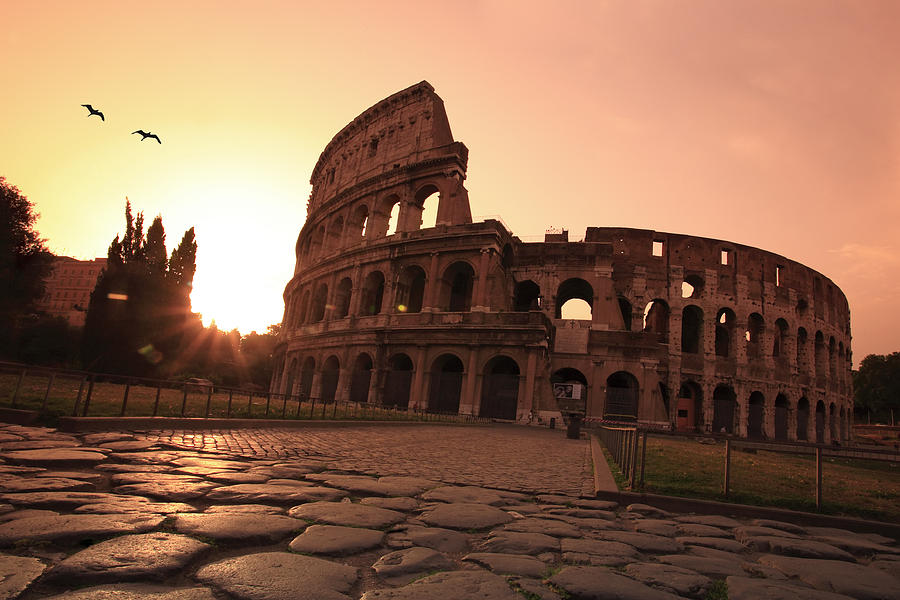p/c Michele Falzone, Colosseum at Sunrise
I know that most evangelical “non-dommers” do not like the term “Protestant” anymore, but even National Geographic will place Christians who confess the Trinity into one of three categories: Catholic, Orthodox or Protestant. So, for the sake of brevity (and accuracy) I’m going to conglomerate under the title Protestant all of these: {emergent-Church folks, Mega-Church folks, Baptists, Pentecostals, Lutherans, evangelicals, Methodists, etc., etc.}
With more and more Protestants following me on Twitter (especially evangelicals) and more and more Catholics attacking me on Twitter (especially liberal ones) I really don’t like to write blog posts against Protestants anymore, considering I now have more in common with most evangelicals on the inerrancy of Scripture and the death-injection than 99% of the Roman Catholic bishops of the world. So, I do consider evangelicals to be men and women of good will who are exponentially more kind to me (and faith-filled followers of Jesus Christ) than most progressive Catholics I meet.
But despite our hierarchy that is truly making it clear that the third Secret of Fatima was an apostasy from the top down, I still believe the only Church that Jesus Christ founded was: One, Holy, Catholic and Apostolic. All of the Holy Fathers also recognize the primacy of place of Rome. No one studying the early Church of Christians can deny this.
So, here’s my little challenge that I will sometimes say to Protestants: If you can find me one Christian in the first thousand years of Christianity (who you don’t think was a heretic) who denied the True Presence of Christ in the Eucharist or the Perpetual Virginity of Mary or the importance of the intercession of the Saints, I will not only leave the Catholic Priesthood, I will leave the Catholic Church.
Of course, I could dial that line “First thousand years” up to “first fifteen hundred years” to bring us right to the Protestant revolt, but I would rather people focus on the Christians of the first thousand years since everyone seems to want to go back to how the first-and-second generation after the Apostles lived and worshipped and spoke and prayed and played (as well as we should.) Nowadays, evangelical Protestants now claim not only St. Francis of Assisi as “a true Christian” but somehow have appropriated even St. Patrick (yes, the one who evangelized Ireland) as a true Christian.
Well, that’s nice they admit those two saints are “true Christians,” but those two saints (St. Francis and St. Patrick) were Roman to the core. And even the early Eastern Saints in Cappadocia (modern day Turkey) all had the same beliefs listed above, namely, the True Presence of Christ in the Eucharist, the Perpetual Virginity of Mary and the importance of the intercession of the Saints…as well as a thousand other beliefs that many Protestants still reject.
Granted, some Protestants facing my above challenge of finding an early non-Catholic Christian would smugly reply, “the Apostle Paul.” But one can easily retort that St. Paul never would have believed a “symbol” could be sacrileged if he wrote of the Holy Eucharist: Therefore, whoever eats the bread or drinks the cup of the Lord in an unworthy manner will be guilty of sinning against the body and blood of the Lord. A man ought to examine himself before he eats of the bread and drinks of the cup. For anyone who eats and drinks without recognizing the body of the Lord eats and drinks judgment on himself. That is why many among you are weak and sick, and a number of you have fallen asleep.—1 Cor 11:27-30 NIV. (Notice I’m using a Protestant translation above and below to make my point.)
I used to take part in “verse-wars” with Protestants late at night at Denny’s and other places. But I realized that everyone just ended up proof-texting their favorite verses without going anywhere in a late night “verse-war.” Later, I realized: If the Holy Spirit let the early Christians fall into apostasy immediately following the death of the last Apostle until Martin Luther came around, then modern Protestants are holding nothing different from the Mormon “Great Apostasy.” In other words, the assert: God failed the Church until INSERT HERE Martin Luther -or- Joseph Smith.
Evangelical Protestants are slowly waking up to see how preposterous this notion is. Evangelical seminaries (like the Denver Seminary here in Colorado) have thousands of volumes on the Church Fathers. Why? Because they now secretly know the water is coolest and cleanest at the source. They can no longer dismiss the Sacred Scriptures that read: But the Counselor, the Holy Spirit, whom the Father will send in my name, will teach you all things and will remind you of everything I have said to you.—John 14:26 NIV and So then, brothers, stand firm and hold to the teachings we passed on to you, whether by word of mouth or by letter.—2 Thess 2:15 NIV.
These two above quotes mean that the notion that the Holy Spirit “failed” the early Church would be utter blasphemy for either a Catholic or a Protestant (evangelical) or an Orthodox (eg Russian Orthodox.) So, instead of “verse-wars” with Protestants, you may consider such a dangerous wager: If you can find me one Christian in the first thousand years of Christianity (who you don’t think was a heretic) who denied the True Presence of Christ in the Eucharist or the Perpetual Virginity of Mary or the importance of the intercession of the Saints…I will leave the Catholic Church.
Even if you’re not ready for such a risky wager, trust me—they will find no one.
